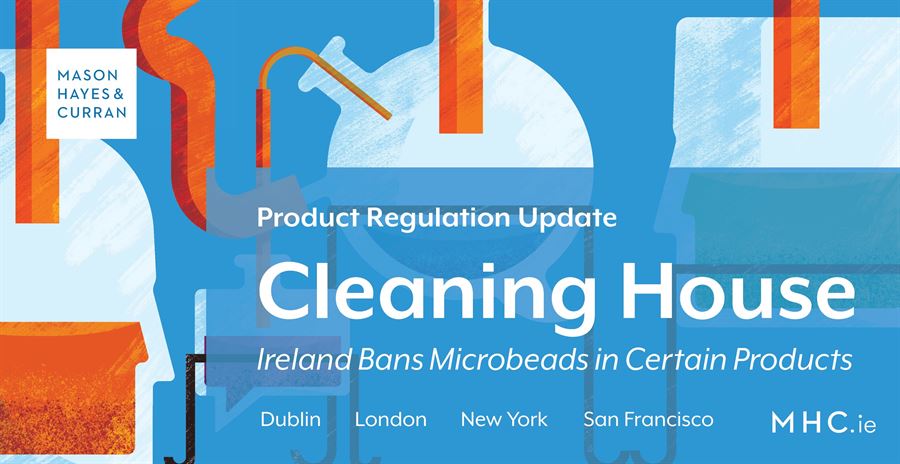
For a number of years, the EU has been calling for a ban on microplastics. Since 2015, Ireland has promoted an EU wide prohibition on the manufacture or supply of products containing microbeads. Ireland decided to lead by example, and the Microbeads (Prohibition) Act 2019 was commenced on 20 February 2020.
What are microplastics and microbeads?
Microplastics are small non-biodegradable solid plastic particles less than 5mm wide or fibres which are less than 20mm long.
Microbeads are often used as emulsifying agents or for exfoliation purposes in cosmetic products – like toothpaste, body washes or exfoliating scrubs. They are used in household and industrial cleaning products and can also be found in medicinal products and sunscreen.
As microbeads are so small, they cannot be caught by water filtration systems and end up in lakes or rivers, building up as plastic pollution.
In October 2017, the European Commission published a study providing information on the risks microplastics pose to human health and the environment. In 2019, the European Chemicals Agency (ECHA) proposed wide-ranging restrictions on microplastics, with the aim of cutting down emissions by at least 85%. The ECHA’S Committees are currently adopting their final opinions on the restriction proposal.
What is banned by the Microbeads (Prohibition) Act 2019?
The manufacture or placing on the market of (1) cosmetics and personal care products, and (2) household and industrial cleaning products, that may be washed or rinsed off by water and that contain plastic microbeads, is prohibited in Ireland. Ireland is the first EU member state to extend the prohibition to cleaning products.
However, the Act specifically exempts medicinal products and sunscreen from the prohibition and provides the Minister with power to exempt specified industrial cleaning products if there is no effective alternative.
In this context, ‘placing on the market’ is defined as to:
- Sell
- Offer or expose for sale
- Advertise or invite an offer to purchase
- Distribute free of charge
- Import or export, or
- Supply for any of those purposes, whether or not for profit
Additionally, the Act makes it an offence to dispose of any substance containing microbeads by pouring it down the drain or into marine or freshwater environments.
Enforcement
The Environment Protection Agency (EPA) will be responsible for the implementation and enforcement of the Act, with assistance from Ireland’s police force, An Garda Síochána or Customs Officers, if necessary.
The penalties provided for under the Act are as follows:
- On summary conviction: a class A fine (€5000) and/or up to 6 months’ imprisonment
- Conviction on indictment: fine of up to €300,000 and/or up to 5 years’ imprisonment
Exemption from EU Single Market Rules
As the Act limits the kind of products that can be sold in Ireland, an exemption under EU Single Market Rules was needed. In October 2019, after the required three month standstill period, the Commission raised no objection and the Act was given the greenlight.
Impact on Irish companies now and in the future
Any company which manufactures or sells products containing microbeads in Ireland will need to remove these products from the market until they can be redeveloped, or risk enforcement action being taken by the EPA.
Ireland continues to work to develop a range of other national and international measures, so we predict that we will see further regulation on an EU or national level in the foreseeable future. We will be keeping abreast of all developments, in particular if any change to the current exemption for medicinal products or sunscreen is proposed.
Conclusion
As it is early days, the extent of the impact of these new rules for manufacturers of products containing microbeads remains to be seen. Companies should however take the necessary steps now to ensure compliance with the Microbeads (Prohibition) Act 2019.
If you wish to discuss how the new legislation impacts your business, please contact a member of our Product Regulation team.
This insight was contributed by Sarah Moynihan, Associate.
The content of this article is provided for information purposes only and does not constitute legal or other advice.




